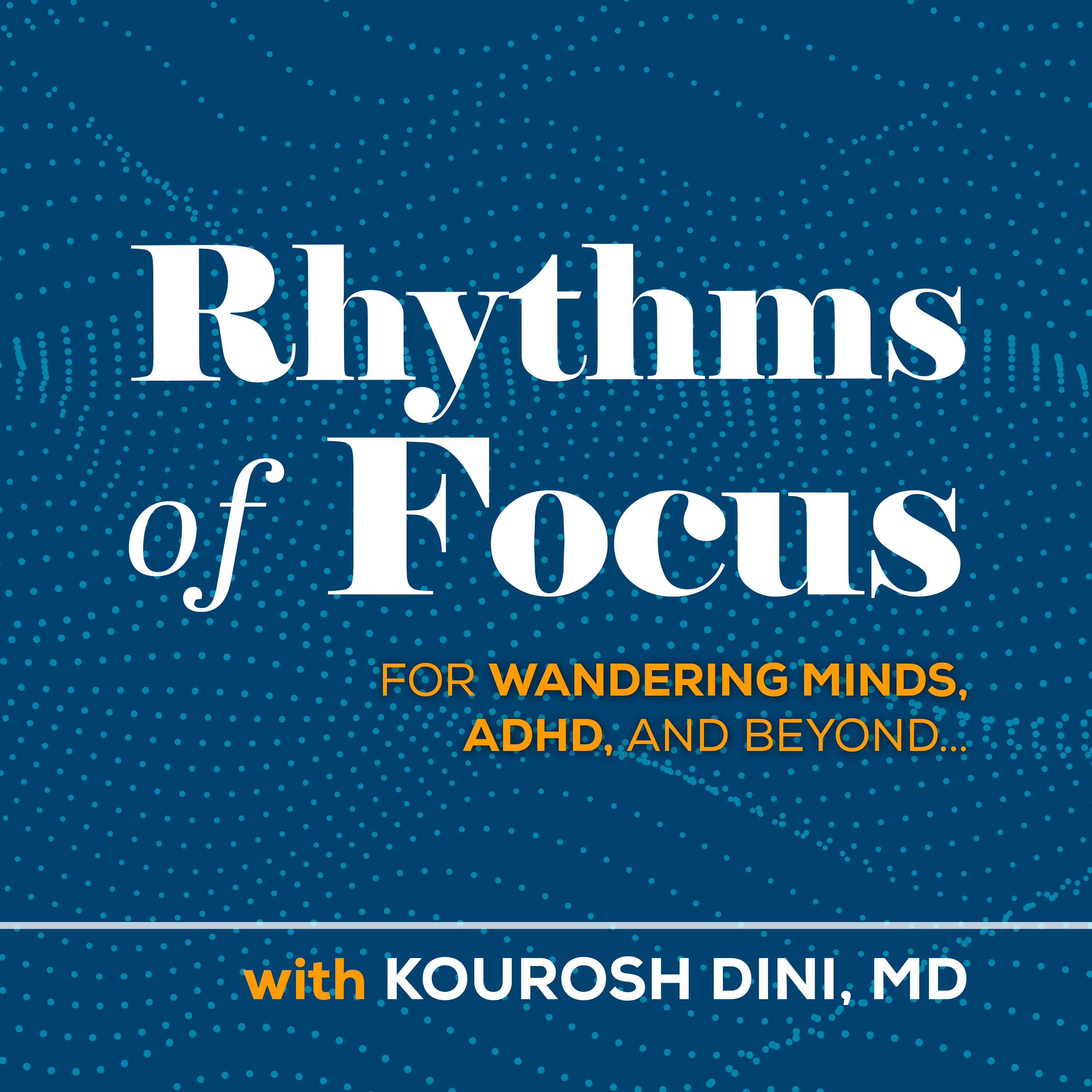Episode 1
1. Hello, Fellow Wandering Mind!
S01E01 - Rhythms of Focus: Hello, Fellow Wandering Mind!
Summary
In this episode, we explore the concept of a 'Wandering Mind' as an alternative to the medicalized term ADHD, delving into its multifaceted nature encompassing both challenges and beauties. Through personal anecdotes and professional insights, the speaker discusses how societal perceptions often simplify complex symptoms, and advocates for recognizing the meaningful aspects of neurodivergent experiences. The episode promises a journey into understanding how a wandering mind can navigate life, find focus through passion and mastery, and culminates with a musical piece titled 'Belly' that illustrates this path.
Key Points
1. Considering the Wandering Mind
The episode introduces the concept of the "Wandering Mind" as a compassionate, non-pathologizing view of mind. This term emphasizes the universality of mind-wandering and its potential for creativity and connection, rather than framing it as a medicalized problem, while acknowledging thresholds beyond which can be debilitating.
2. Rhythms of Focus and Meaningful Engagement
Focus is presented not as a binary state but as a rhythm that can be orchestrated throughout the day. By balancing engagement and rest, and seeking meaningful connections, individuals can create paths that feel alive and true to their inner selves.
3. Mastery Through Guided Play
The episode highlights the importance of guided play in developing mastery and meaningful work. By connecting with passions and engaging in small, manageable steps, listeners are encouraged to transform frustration into growth and creativity.
00:00 The Power of Words and Identity
02:35 Embracing the Wandering Mind
04:35 The Beauty in Wandering, Nature and Neurodivergence
06:04 Orchestrating Our Days
07:16 The Path of Mastery and Passion
08:23 Music as a Personal Journey & and Invite to Reflect
Transcript
The Power of Words and Identity
ADHD is a powerful term. It has its strengths, but the word also has its share of troubles. I like the phrase "Wandering Mind" because it helps distance us from that medicalized view. Certainly it's poetic, but it still carries that sense of trouble that we have, but it also opens us up to the beauties of this way of being.
ADHD is a powerful term. All words are powerful, but this one in particular has caught my eye. We can hold on to these ideas, these words as a part of our identity. It can be a shorthand for this mixed set of symptoms, behaviors, and the like.
We can joke with it, we can cry with it, we can yell at others, don't understand us, and point to various people in lab coats and say, "Hey, look. It's a real thing." We can use it as a shield, even use it against ourselves. We could also use it to support ourselves, have conversations with it, connect, understand things we didn't understand before.
Most any diagnosis, particularly in the mental health field, can have these characteristics. But what is it?
Embracing the Wandering Mind
While I do diagnose ADHD, I treat and prescribe around it. I've also grown to use the words "Wandering Mind." Now, why would I go and do that?
Well, first of all, it's not medical. There's nothing good or bad about it. Second, everyone's mind wanders, some certainly more than others, some at different times of life, some at different times of day, sometimes particularly after a stressful event.
You see, there are many ways to arrive at a wandering mind.
I remember one of my first days as a doctor, this young intern, a nurse, had approached me to tell me that a patient that was now in my care had a fever of 101. Could I give them this order to prescribe something to break the fever?
There were two problems with this. One it wouldn't tell me where the fever was coming from. There are many ways that a fever can show up and to simply hide the symptom might, might even make it harder to figure out what's going on.
Secondly, fevers can be very beneficial. Within a certain range, they help the body mount a better immune response.
Simply looking at the numbers, the symptoms, and saying, "Hey, go away," is the same as shooting the messenger, even when the messenger's news was good. I think too often we look at our symptoms and say, alright, these troubles that we have, the mind is going faster than we can keep up with. And "hey, this is bad. Let's get rid of it."
As a society, we fall into these sorts of ruts. We decide on a thing as being good or bad, and then cast our pronouncements on them and yell at them forever.
The Beauty in Wandering, Nature and What Feels Real
That phrase, "Wandering Mind" again carries trouble, but also beauty.
We engage, we disengage. We don't just follow whim. We follow what feels true, true to the moment and true to ourselves. Why pursue something that feels dry dying when there's something else that sparks us to life?
In fact, one of the things that I've noticed about wandering minds is not only the want, but perhaps even a need. To hold on to the things that feel real, things that connect with us, things that have meaning.
This is why I think that many with ADHD, autism, or neurodivergent, or the like, feel more at ease when in nature. There's something about it that connects to us. Something feels real.
And this is why I think many also get called oppositional in school. It's not that they're oppositional for the sake of it, it's that they recognize something doesn't feel real. They ask,
"When am I gonna use this?"
That question can become this genuine attempt to connect with something within.
Unfortunately we do also need to do the things that don't connect with us in that way, in that moment. We might look at a thing and say, oh, that's important to do, or else something bad will happen. Or maybe that's important because something good will happen, but it's not revving our engines in the moment.
And there are many of these sorts of things to do.
Orchestrating Our Days
So over the course of this podcast, I'll be visiting, revisiting, investigating, looking at the world through the eyes of the Wandering Mind.
I've titled this Rhythms of Focus because I don't think our focus is a thing that we turn on or off. We have those times where we get into something, dive in, dive deep, and we have those times where it's a struggle to make anything happen.
But I think there are ways that we can orchestrate our days, create these rhythms between what works. We can bounce between this and that, engaging here and there, in ways that help us move forward such that they feel meaningful to us.
We can think about resting, for example. But what is resting? It's not just lying down and closing our eyes, though sometimes it is that. But it's often about doing something else.
So if we can figure out the ways these things can compliment each other, we can create paths that work for us. We can engage the rhythms of our days, shape them as we'd like so that they can work in our favor.
Mastery as an Organizing Force
Now, one thing in particular that seems to help a Wandering Mind is a path of mastery or perhaps passion. And what do I mean by that?
I use these terms to mean something that we connect with viscerally, that nonverbal space somewhere that we understand something.
While we certainly can study and maybe get into things that others say, it's still about having this way of measuring it internally in that primal world . It's where we can play and care about those experiential atoms of the universe.
A mantra I often use and return to is:
"Mastery and meaningful work, develop from guided play and care."
I will say that again. Mastery and meaningful work develop from guided play and care. These emotions of play and care exist as their own spirits, their own flow. Guiding them over time is the work of practice.
For some, this is found in their work. For others in relationships, others in painting or gardening, or playing games among many other possibilities.
For me, it's been about music. I like to think that music's a big deal for humanity in general, but , I'm biased. All this is to say that I plan on ending these episodes with some piece of music that I've played, something I've learned or created.
I like to share, maybe even show off a little, but you'll also notice that there are some mistakes here and there and things that I'm improving.
I even plan to share some thoughts and ideas about how I'm developing things over time. You see, I'm trying to present a path of mastery and passion so you can hear it, because that's what it is. Mastery is more a path than it is some line crossed.
Before I present the piece today, I'd like you to maybe consider for a moment, is there somewhere in your life that you feel you connect with in that primal, playful place where there aren't even words for it, where you can measure it against that sense within yourself.
That feeling of intuition that you might wanna develop over time. It can be a powerful organizing force in your life.
So this piece that I'll be playing for you here is called Belly. It's a simple piece, and I do hope you enjoy it.
Mentioned in this episode:
Rhythms of Focus - CTA - Subscribe, Rate, and Review
Transcript
S01E01 - Hello Fellow Wandering Mind
===
[:---
[: [: [: [:---
[: [: [: [: [: [: [: [: [: [:---
[: [: [: [: [: [: [:---
[: [: [: [: [:---
[: [: [: [: [: [: [:---
[: [: [: [: [: [:

